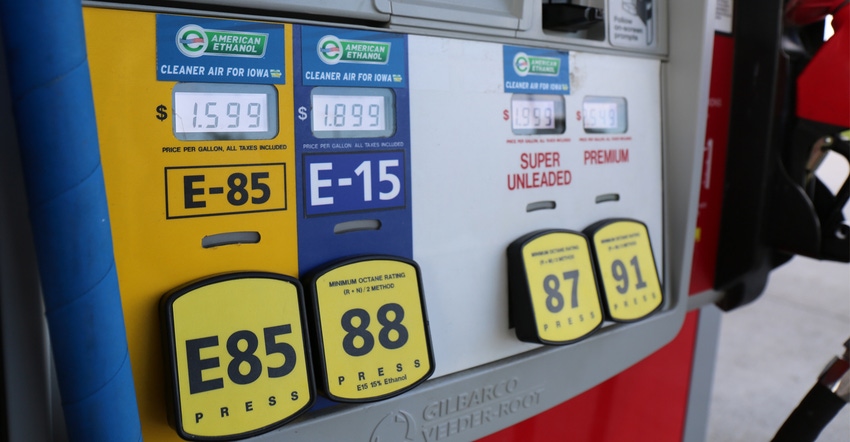June 11, 2020

On their first day back at the Iowa Capitol, state legislators wasted no time getting to work on important policies. On June 3, the Iowa Legislature reauthorized the Iowa biofuel tax differentials to help increase demand for ethanol and biodiesel and provide lower fuel prices for motorists.
Senate File 2403, which unanimously passed both the House and Senate, extends and modernizes fuel tax differentials for E15 and higher ethanol blends, as well as for B11 and higher biodiesel blends. The current biofuel tax incentives were set to expire June 30.
Passage of this bill signals continued support of renewable fuels and will put millions of dollars back into the Road Use Tax Fund each year for maintaining and improving highways, bridges and vital infrastructure projects.
The bill is awaiting Gov. Kim Reynolds’ signature. Once the legislation is signed into law, the biofuel tax differentials for E15 and higher blends of ethanol along with B11 and higher blends of biodiesel will be extended for six years — until June 2026.
Some sunshine for dark days
“Reauthorization of the state biofuel tax differentials is a ray of sunshine during some of the darkest days Iowa biofuels have ever faced,” says Nathan Hohnstein, policy director for the Iowa Renewable Fuels Association. “We thank Iowa’s elected leaders for reauthorizing a program that is working to boost biofuel demand.”
The unanimous passage of the fuel tax incentive legislation sends a strong message of support to Iowa ethanol and biodiesel producers. “Iowa biofuel plants are still struggling to claw their way back from the demand destruction caused by the response to the COVID-19 pandemic,” Hohnstein says. “People are driving their cars a lot less. Also, the Renewable Fuel Standard exemptions granted to oil refiners by EPA have definitely hurt demand for renewable fuels.”
Iowa’s biofuel tax differentials were established in 2001 for ethanol and 2015 for biodiesel, and since then, sales of ethanol and biodiesel have increased dramatically. “We urge Gov. Reynolds to sign this new bill into law, ensuring Iowa continues to build on this progress,” Hohnstein says.
Over the years since the first fuel tax differential legislation was passed, E10 and higher ethanol blends along with B11 and higher biodiesel blends have grown to make up about 90% and 57% of fuel sales, respectively. This data is for 2019, collected by the Iowa Department of Revenue.
Modernizing the tax differential
The new fuel tax bill modernizes the ethanol tax differential by applying it only to E15 and higher blends, Hohnstein says. The E10 blend, already widely used by motorists, would no longer qualify for the tax break. The purpose of modernizing the fuel tax for ethanol is to encourage motorists to use higher blends such as E15 and higher.
The fuel tax differential in the new legislation calls for E15 and higher ethanol blends such as E85 to be taxed at 6 cents less per gallon than E10 or unblended gasoline. As the market share increases, the tax differential decreases. “E15 and higher blends start at the 6-cent differential and once the use of the blend hits 10% of the market share, the differential will decrease as market share increases,” he says.
For biodiesel, the newly passed legislation offers a 3-cent-per-gallon tax rate reduction for blends of diesel fuel that have at least 11% biodiesel or more. However, once the biodiesel blend reaches 50% market share or greater, the tax differential is reduced.
B11 and higher blends will continue its current 3-cents-per-gallon tax rate reduction this fiscal year because it was below 50% market share last year. But because its market share has climbed to 57%, according to the latest Department of Revenue report released in April, the differential for the next fiscal year beginning July 1 will be 2.4 cents.
Incentive to boost biodiesel use
Over the years, Iowa has had several fuel tax incentive policies in place to gradually encourage increased use of biodiesel. Before the B11 and higher 3-cent tax differential, there was a fuel tax break for using a B2 blend, and then it moved up to a B5 blend.
Considering that nearly half of the on-road diesel fuel gallons sold in Iowa now contain B11 or higher biodiesel blends, the new legislation will benefit consumers at the pump and further support Iowa’s biodiesel producers, Hohnstein says. Passage of the B11 fuel tax incentive provides certainty for the biodiesel market and will help the struggling soybean and corn markets by increasing the use of soybean oil and corn oil to produce biodiesel.
Cost-share for blender pumps
The Iowa Legislature is considering another biofuel-related bill. Ideally, coupled with the biofuel tax credit for ethanol and biodiesel is the opportunity for lawmakers to appropriate an additional $3 million for the state’s renewable fuels infrastructure program (RFIP). This program provides cost-share help for fuel retailers to install blender pumps, tanks and other needed equipment to handle higher blends of biofuel to sell to the motoring public.
The RFIP has historically been funded at $3 million per year. The cost-share program used all appropriated funds for fiscal year 2020 by the third quarter and is currently waiting for the new appropriation for fiscal 2021, so the program can continue to issue grants.
For more information on renewable fuels, visit iowarfa.org.
About the Author(s)
You May Also Like






